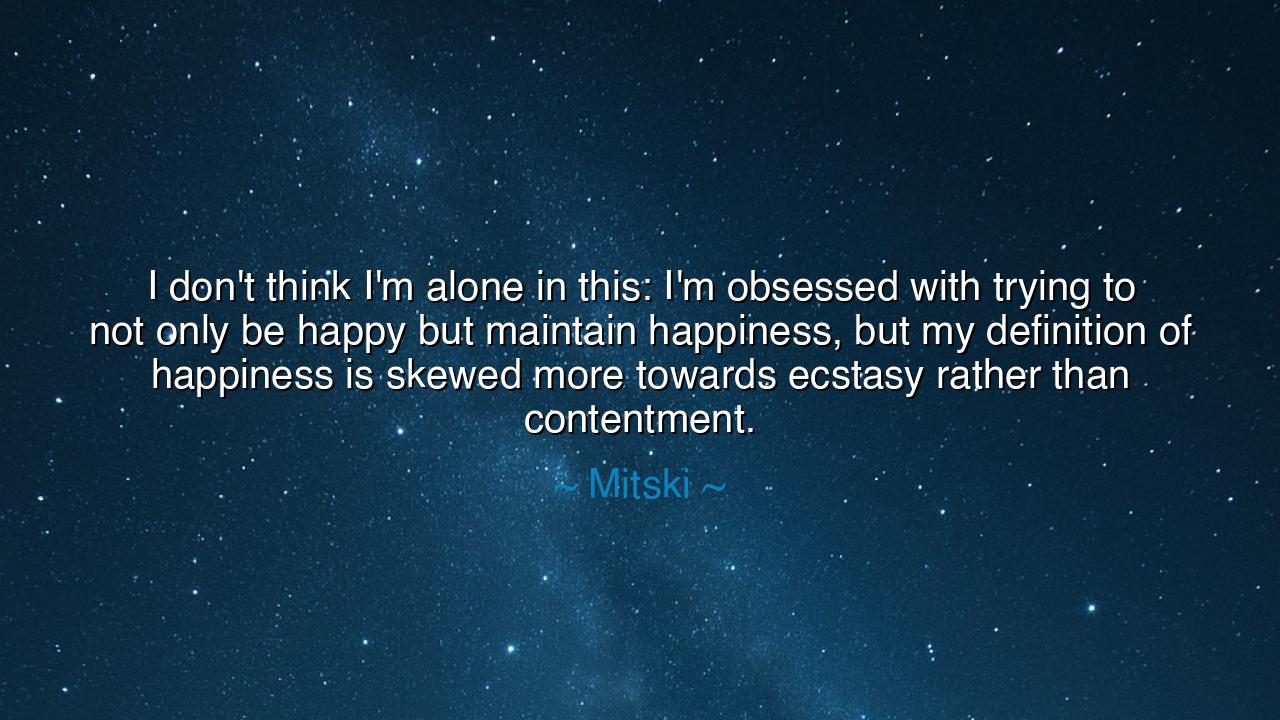
I don't think I'm alone in this: I'm obsessed with trying to not
I don't think I'm alone in this: I'm obsessed with trying to not only be happy but maintain happiness, but my definition of happiness is skewed more towards ecstasy rather than contentment.






“I don't think I'm alone in this: I'm obsessed with trying to not only be happy but maintain happiness, but my definition of happiness is skewed more towards ecstasy rather than contentment.” — Thus speaks Mitski, a poet of our modern age, whose words echo like an ancient lament for the restless soul of humanity. In these few lines, she unveils a truth that has haunted humankind through every era: the ceaseless pursuit of happiness, that fleeting radiance we grasp for as if it were the sun itself. Yet, she confesses that what she seeks is not peace but rapture—not the calm lake of contentment, but the roaring ocean of ecstasy. Her struggle is our own, the struggle of those who burn too brightly to rest in stillness.
In the old days, the sages taught that true happiness lies in balance. The Stoics called it eudaimonia, a state not of excitement, but of harmony between reason and desire. But Mitski’s words speak of a world that no longer rests in balance; ours is a world of fire and hunger. We no longer wish merely to live well—we wish to feel alive, to be consumed by moments of fierce joy that lift us beyond ourselves. And so, like Icarus, we fly toward the sun, knowing its light may melt our wings, yet unable to resist its pull. For the taste of ecstasy is intoxicating; it feels like touching eternity, if only for a moment.
Yet even the ancients knew that ecstasy, though divine, cannot be sustained. Consider the story of Alexander the Great. Conqueror of worlds, he sought not peace but the ecstasy of victory, the fire of endless ambition. But when there were no more lands to conquer, he wept, for the world itself could no longer satisfy him. His triumph became emptiness; his ecstasy turned to despair. So too does Mitski’s confession remind us that to seek constant ecstasy is to chase a mirage—it glows, it dazzles, but it vanishes when we reach it. The heart cannot dwell forever in the realm of the gods; it must sometimes walk among men.
Still, we must not despise that yearning. It is the mark of the living soul to crave more than the ordinary. The hunger for ecstasy springs from the same root as art, as creation, as love. It is the fire that moves poets to write and lovers to sacrifice. The danger lies not in the longing, but in the illusion that ecstasy is the only form of happiness worth having. For even the dawn would lose its glory if it were always day. It is the rhythm between light and shadow that makes life beautiful—the rising and falling, the surge and the stillness.
To live wisely, then, is to learn the sacred art of alternation—to dance between ecstasy and contentment without being enslaved by either. There is a time to soar and a time to rest your wings. The ancients knew this well: after the wild festivals of Dionysus came the calm wisdom of Apollo. Joy and peace are not enemies; they are two notes in the same song. He who knows how to cherish both finds a deeper form of happiness, one that does not shatter with every storm.
In our modern world, where every heart seeks constant stimulation, Mitski’s words are both a confession and a warning. To be obsessed with happiness is to risk losing it entirely. The more we demand that joy stay with us, the faster it slips away, for happiness is not a prisoner to be chained—it is a guest to be welcomed. One must open the door to contentment, even as one still dreams of ecstasy. The wise soul does not reject the fire but learns to tend it gently, so that it warms rather than consumes.
So remember this teaching, child of tomorrow: do not chase ecstasy as if it were the only form of joy. Let it come and go as the tide, and learn to love the quiet waters that remain. Practice gratitude for the soft, unglamorous moments—the cup of tea, the silence of dusk, the steady breath of a loved one beside you. These are not lesser joys; they are the roots that nourish the fleeting flowers of ecstasy. Live as the ancients lived—burn brightly, yes, but learn to rest in peace between the flames.
For the lesson is eternal: the pursuit of unending happiness leads only to sorrow, but the embrace of life in all its shades leads to wholeness. Seek not to hold happiness forever—seek to be worthy of it when it visits you. And when it departs, do not grieve; it will return again, as surely as dawn follows night.






AAdministratorAdministrator
Welcome, honored guests. Please leave a comment, we will respond soon